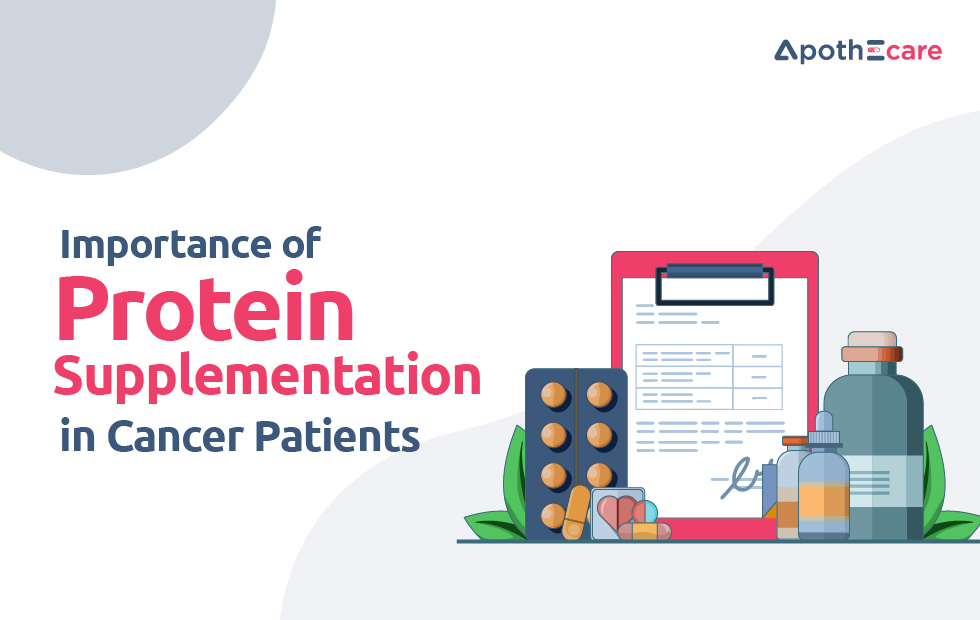
Best High-Protein Foods for Cancer Patients: A Practical Nutrition Guide
Cancer is a disease that affects the entire body, not just particular organs. A person's strength and immunity might be significantly weakened by the physical strain of the illness as well as the adverse consequences of therapies like chemotherapy, radiation, and surgery. Malnutrition, particularly protein insufficiency, is one of the most prevalent and dangerous issues that cancer patients deal with.
Protein is necessary for immune system maintenance, growth, and tissue repair. Your body may break down muscle to generate the fuel it needs if it doesn't get enough protein. This can reduce resistance to infection and prolong the time it takes to recover from illness. Cancer patients frequently require more protein than normal. Extra protein is typically required to promote tissue healing and aid in the fight against infection following surgery, chemotherapy, or radiation therapy.
Understanding Protein and it’s Role in the Body:
Proteins are made up of many building blocks, known as amino acids. To provide amino acids for the development and upkeep of our cells and tissues, our body need protein from our food. The amount of protein we need in our diet varies as we age. Adults should take at least 0.83 g of protein per kilogram of body weight per day, according to the European Food Safety Authority (EFSA) (e.g., 58 g/day for a 70 kg adult). The quality and digestibility of proteins derived from plants and animals differ, but most people don't mind provided their protein intake is enough overall. In order to improve the environment and our health, we should try to eat protein from a range of sources.
Functions of Protein in the Body:
Our bodies are made up of thousands of different proteins, each with a specific function. Together with numerous enzymes, hormones, and the active proteins released by immune cells, they comprise the structural elements of our cells and tissues. Throughout our lives, these bodily proteins are constantly being replaced and repaired. A steady supply of amino acids is necessary for this process, which is referred to as "protein synthesis." The breakdown of old body proteins can recycle certain amino acids, although this process is not complete. This implies that in order to meet our body's need for amino acids, we must consume protein from our food.
Since protein is necessary for the growth of cells and tissues, getting enough of it is especially crucial during times of rapid growth or higher demand, such childhood, adolescence, pregnancy, and lactation.
Food-Based Protein Supplementation:
When we address protein supplementation, many of us immediately think of powders and shakes. However, the best, safest, and most natural approach for cancer patients to meet their increased nutritional needs is frequently through food-based protein sources. In addition to protein, whole meals contain vital vitamins, minerals, fiber, and antioxidants that promote immunity and recovery.
|
Sl.no. |
Category |
Food Source |
|
1 |
Animal - Based Sources (High biological value Proteins) |
Egg |
|
Poultry |
||
|
Fish |
||
|
Dairy products |
||
|
Bone Broth |
||
|
2 |
Plant - Based Sources (Vegetarian friendly) |
Nuts & Seeds |
|
Legumes |
||
|
Soy products |
||
|
Whole Grains |
||
|
Sprouts |
Eggs:
· Eggs that are scrambled or soft-boiled are easy to digest and gentle to the stomach.
· They include important vitamins, minerals, and high-quality protein that aid in muscle healing and repair.
Poultry:
· Compared to red meats, skinless chicken and turkey are lower in fat and higher in lean protein.
· They support the preservation of strength and muscular mass without straining the digestive system.
Fish:
· Effective sources of lean protein include sardines, salmon, and tuna.
· Additionally, they offer omega-3 fatty acids, which promote heart health, lower inflammation, and increase resistance to treatment.
Dairy Products:
· Calcium and protein are found in milk, yogurt, paneer (cottage cheese), and cheese.
· Additionally, these meals contain probiotics (found in yogurt) that support gastrointestinal health, which may be impacted by chemotherapy.
Bone Broth:
· A healthy alternative that is low in fat and high in protein.
· Collagen and minerals found in it promote joint health, healing, and general recovery.
Nuts & Seeds:
· Protein, good fats, and antioxidants are all found in almonds, walnuts, chia seeds, flaxseeds, and pumpkin seeds.
· They lower inflammation, promote brain function, and are simple to incorporate into meals or snacks.
Legumes:
· Black beans, kidney beans, chickpeas, and lentils are all great plant-based sources of protein.
· Iron, fiber, and other minerals that support digestion and overall well-being are also rich in them.
Soy Products:
· All of the necessary amino acids are present in tofu, tempeh, soy milk, and soy chunks, making them complete protein sources.
· They are adaptable and can be added to smoothies, curries, and soups.
Whole grains:
· In addition to offering energy-boosting carbohydrates, quinoa, oats, brown rice, and millet all give extra protein and fiber.
· Because it is a complete plant protein, quinoa is very important.
Sprouts:
· Alfalfa and mung bean sprouts are nutrient-dense, light, and easy to digest.
· They offer proteins, vitamins, and enzymes that support healing and strengthen immunity.
FAQs:
1. Why is protein essential for people with cancer?
Protein is necessary for immune system strengthening, tissue healing, muscle mass maintenance, and post-chemotherapy, post-radiation, and post-operative recovery.
2. What is the recommended daily intake of protein for a patient with cancer?
Generally speaking, cancer patients may require 1.2 to 2.0 grams of protein per kilogram of body weight per day; however, a physician or nutritionist should ascertain the precise amount needed.
3. Is it possible for cancer patients to have too much protein?
Consuming too much protein can put stress on the liver or kidneys, particularly if you already have health issues. A physician or dietician should always be consulted before consuming any food.
4. What happens if a patient with cancer consumes insufficient amounts of protein?
Lack of protein can result in fatigue, poor wound healing, muscle loss, weakness, an increased risk of infection, and a decreased ability to withstand cancer treatments.
5. Can cancer patients safely consume protein powders?
Yes, if a medical professional recommends them, the majority are safe. It's crucial to select high-quality, readily digestible, low-sugar choices and refrain from self-prescribing without a doctor's advise.
Reference:
1. https://www.mdanderson.org/cancerwise/6-easy-protein-sources-for-cancer-patients.h00-159699912.html
2. https://www.cuddlesfoundation.org/how-protein-rich-foods-can-help-in-cancer-recovery/
3. https://www.healthline.com/nutrition/high-protein-foods
4. https://www.medicalnewstoday.com/articles/321522
5. Orsso CE, Caretero A, Poltronieri TS, Arends J, de van der Schueren MA, Kiss N, Laviano A, Prado CM. Is high-protein supplementation beneficial for patients on cancer treatment? A Systematic review and meta-analysis. Clinical Nutrition ESPEN. 2024 Oct 1;63:1054.
6. Ravasco P. Nutrition in cancer patients. Journal of clinical medicine. 2019 Aug 14;8(8):1211.





